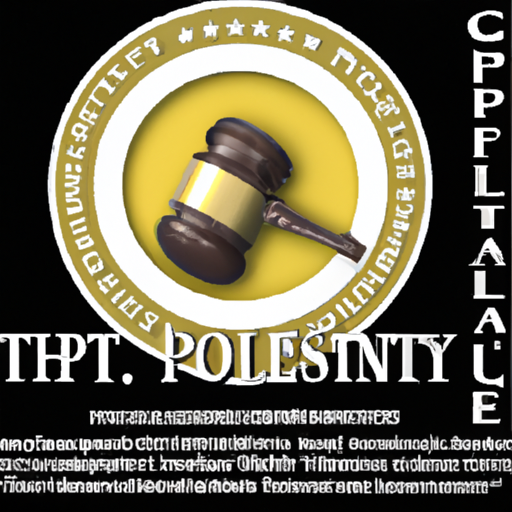When it comes to protecting your intellectual property, you need a lawyer who understands the complexities of this area of law and can provide expert guidance tailored to your specific needs. That’s where our Intellectual Property Lawyer in Cottonwood Heights, Utah, comes in. With a deep understanding of the unique challenges that businesses face in today’s fast-paced digital landscape, our lawyer is dedicated to helping businesses and business owners secure their valuable intellectual assets. Whether you need assistance with trademarks, copyrights, patents, or trade secrets, our lawyer has the knowledge and experience to provide you with the effective legal solutions you need. So don’t leave your intellectual property vulnerable – contact our Intellectual Property Lawyer in Cottonwood Heights, Utah, today for a consultation.
What is Intellectual Property Law?
Intellectual Property Law is a branch of law that focuses on protecting the rights of individuals and businesses over their creations or inventions. It involves various legal frameworks and regulations that safeguard intellectual property assets, such as patents, trademarks, copyrights, and trade secrets. Intellectual property law aims to encourage innovation, creativity, and economic growth by providing exclusive rights and incentives to those who have invested their time, effort, and resources in developing intellectual property.
Explanation of intellectual property
Intellectual property refers to intangible creations of the human intellect that have value and are eligible for legal protection. These creations can take various forms, including inventions, literary and artistic works, symbols, names, images, designs, and proprietary information. Intellectual property is categorized into different types, each with its own set of laws and regulations governing its protection and use.
Types of intellectual property
There are four main types of intellectual property:
-
Patents: Patents protect new inventions, processes, and technologies, granting the inventor exclusive rights to their invention for a limited period. This allows them to control the use, manufacture, and sale of their invention.
-
Trademarks: Trademarks are distinctive signs, symbols, or logos that distinguish goods or services of one entity from another. They provide brand recognition and prevent others from using similar marks that may cause confusion among consumers.
-
Copyrights: Copyrights protect original works of authorship, such as literary, artistic, musical, and dramatic creations. They give creators the exclusive right to reproduce, distribute, perform, display, and modify their works.
-
Trade Secrets: Trade secrets encompass confidential information, formulas, processes, or methods that give businesses a competitive advantage. Unlike patents or copyrights, trade secrets are not publicly disclosed and are protected through confidentiality agreements and other contractual arrangements.
Importance of intellectual property law
Intellectual property law plays a crucial role in fostering innovation, creativity, and economic growth. It provides legal protection and incentives for individuals and businesses to invest in research, development, and the creation of new ideas, products, and services. By granting exclusive rights over intellectual property, it encourages invention, artistic expression, and technological advancements.
Additionally, intellectual property law helps maintain a level playing field by preventing unfair competition and unauthorized use of others’ creations. It ensures that innovators and creators can reap the rewards of their hard work, and it creates a framework for resolving disputes and enforcing intellectual property rights.
Why Do Businesses Need an Intellectual Property Lawyer?
Understanding and protecting intellectual property assets is crucial for businesses of all sizes. An intellectual property lawyer specializes in this area of law and can provide invaluable guidance and expertise to businesses seeking to safeguard their intellectual property rights.
Protection of intellectual property assets
An intellectual property lawyer assists businesses in identifying, registering, and protecting their intellectual property assets. They can conduct comprehensive searches to determine the availability of trademarks, copyrights, and patents, ensuring that businesses do not inadvertently infringe on the rights of others. With their knowledge of the law and experience in handling intellectual property matters, lawyers can help businesses develop effective strategies for protecting their valuable intellectual property assets.
Enforcement of intellectual property rights
Should a business’s intellectual property rights be infringed upon, an intellectual property lawyer can take legal action on their behalf. They can draft cease and desist letters, file lawsuits, and negotiate settlements to protect the business’s interests. Intellectual property lawyers have the expertise to navigate complex legal processes and ensure that businesses’ rights are upheld.
Risk management and prevention of infringement
An intellectual property lawyer offers risk management services to help businesses minimize the risk of intellectual property infringement. They can review contracts, licenses, and agreements to ensure that businesses are not unknowingly granting others the right to use their intellectual property. Intellectual property lawyers also conduct due diligence to identify potential risks and advise businesses on how to proactively protect their intellectual property assets.

Qualities to Look for in an Intellectual Property Lawyer
When seeking an intellectual property lawyer to represent your business, several qualities and attributes are worth considering. These qualities will ensure you receive expert guidance and effective representation.
Experience and expertise in intellectual property law
One of the essential qualities to look for in an intellectual property lawyer is their experience and expertise in the field of intellectual property law. They should have a deep understanding of the laws, regulations, and procedures related to trademarks, copyrights, patents, and trade secrets. Look for a lawyer who has dedicated their practice to intellectual property law and has a track record of handling similar cases successfully.
Strong track record of successful cases
A reputable intellectual property lawyer should have a strong track record of successfully representing clients in intellectual property cases. They should be able to provide references or case studies that demonstrate their ability to protect and enforce intellectual property rights. Consider choosing a lawyer who has experience representing clients in your specific industry or business sector.
Ability to provide strategic advice and guidance
Intellectual property lawyers not only handle legal matters but also provide strategic advice and guidance to businesses. Look for a lawyer who can offer insights into intellectual property strategy, help you identify opportunities for protection, and provide recommendations on how to strengthen your intellectual property assets. They should be proactive in finding innovative solutions and protecting your business’s long-term interests.
Services Provided by an Intellectual Property Lawyer
Intellectual property lawyers offer a range of services to businesses in need of comprehensive intellectual property protection. These services encompass various aspects of intellectual property law, including registration, enforcement, and licensing.
Trademark registration and maintenance
One of the essential services provided by an intellectual property lawyer is trademark registration and maintenance. They assist businesses in conducting comprehensive searches to ensure the availability of trademarks, prepare and file trademark applications, and handle any issues or disputes that may arise during the registration process. Intellectual property lawyers also provide ongoing maintenance services to ensure trademarks remain valid and enforceable.
Copyright registration and enforcement
Intellectual property lawyers can assist businesses in registering their original works of authorship for copyright protection. They guide clients through the copyright registration process, ensuring that all required documentation is prepared and filed correctly. In case of copyright infringement, lawyers can take legal action to enforce copyright rights and protect businesses’ creative works.
Patent application and prosecution
For businesses seeking patent protection for their inventions, intellectual property lawyers can assist with the preparation and filing of patent applications. They work closely with inventors to understand the scope and novelty of their inventions and guide them through the complex patent prosecution process. Intellectual property lawyers also provide expertise in patent portfolio management and can help businesses develop strategies to maximize the value of their patents.
Trade secret protection
An intellectual property lawyer can help businesses safeguard their trade secrets through confidentiality agreements, non-disclosure agreements, and other contractual arrangements. They advise clients on best practices for trade secret protection, including internal policies and procedures. In case of trade secret misappropriation, intellectual property lawyers can take legal action to protect businesses’ proprietary information.
Intellectual property licensing and contracts
Intellectual property lawyers assist businesses in drafting, negotiating, and reviewing intellectual property licensing agreements and contracts. They ensure that the terms of the agreements protect the intellectual property rights of businesses while allowing for the authorized use and exploitation of their intellectual property assets. Intellectual property lawyers also provide guidance on licensing disputes and can represent businesses during licensing negotiations.

How an Intellectual Property Lawyer Can Help Your Business
Hiring an intellectual property lawyer can provide numerous benefits and advantages to your business. Here are some ways in which they can assist you:
Identifying and protecting intellectual property assets
An intellectual property lawyer can help you identify your business’s intellectual property assets and formulate a strategy for their protection. They will conduct a thorough assessment of your creations, inventions, trademarks, and proprietary information to determine their eligibility for legal protection. With their expertise in intellectual property law, they can guide you through the registration process and ensure that your rights are adequately protected.
Assisting with infringement disputes and litigation
In the event of intellectual property infringement, an intellectual property lawyer will be your advocate. They will assess the merits of the infringement claim, gather evidence, and develop a legal strategy to protect your rights. Should litigation be necessary, they will represent your business in court and work to secure a favorable outcome. Intellectual property lawyers are skilled negotiators and can also explore alternative dispute resolution methods to resolve infringement disputes efficiently.
Drafting and negotiating licensing agreements
Intellectual property lawyers have the expertise to draft, negotiate, and review licensing agreements that protect your intellectual property rights while allowing for the authorized use of your creations or inventions. They will ensure that the agreements are comprehensive, address all necessary terms and conditions, and minimize any potential risks or loopholes. A well-drafted licensing agreement can provide your business with a valuable revenue stream while ensuring the proper use and protection of your intellectual property.
Advising on intellectual property strategy
An intellectual property lawyer can offer valuable insights and advice on intellectual property strategy. They will assess your business goals, market conditions, and competitive landscape to develop a tailored strategy that maximizes the value of your intellectual property assets. Your lawyer will provide guidance on the timing and scope of filings, international protection considerations, and potential licensing opportunities. Their expertise will help you make informed decisions and navigate the complexities of intellectual property law.
Intellectual Property Law FAQs
What is the difference between a trademark and a copyright?
A trademark is a distinctive sign used to identify and distinguish goods or services of one entity from those of others. It serves to protect the brand identity and reputation of a business. On the other hand, a copyright protects original works of authorship, such as literary, artistic, musical, and dramatic creations. Copyright grants the creator exclusive rights to reproduce, distribute, display, and perform their works.
How long does intellectual property protection last?
The duration of intellectual property protection depends on the type of intellectual property. Trademarks can be renewed indefinitely as long as they are actively used. Copyright protection generally lasts for the creator’s lifetime plus an additional 70 years. Patents typically have a duration of 20 years from the date of filing. Trade secrets have no fixed duration and can be protected indefinitely as long as they remain confidential.
What is the process for filing a patent?
The process for filing a patent involves several steps. It begins with a comprehensive search to ensure the invention is novel and not already protected by an existing patent. The inventor then prepares a patent application, including a detailed description of the invention, claims defining the scope of protection, and any necessary drawings or diagrams. The application is filed with the appropriate patent office, and the inventor may need to engage in a dialogue with the patent examiner to address any questions or objections. If the patent is granted, the inventor obtains exclusive rights to their invention for the duration of the patent.
What can I do if someone is infringing on my intellectual property?
If someone is infringing on your intellectual property rights, it is important to seek legal assistance from an intellectual property lawyer. They can assess the situation, gather evidence of infringement, and assist you in taking appropriate legal action. This may involve sending cease and desist letters, filing a lawsuit for infringement, or negotiating a settlement. An intellectual property lawyer will guide you through the process and work to protect your rights.
How much does it cost to hire an intellectual property lawyer?
The cost of hiring an intellectual property lawyer can vary depending on several factors, including the complexity of the case, the type of intellectual property involved, and the lawyer’s experience and reputation. Some lawyers may charge an hourly rate, while others may offer fixed-fee arrangements. It is advisable to discuss fees and billing arrangements with the lawyer during the initial consultation to ensure transparency and to get a clear understanding of the costs involved.
Understanding Trademarks
Definition and purpose of trademarks
A trademark is a distinctive sign, symbol, logo, or name used by a business to distinguish its goods or services from those of others. Its primary purpose is to create brand recognition and establish a unique identity in the marketplace. Trademarks serve as a valuable asset for businesses, helping consumers identify and associate specific qualities or attributes with a particular brand.
Trademark registration process
Registering a trademark involves several steps. It starts with conducting a comprehensive search to ensure that the desired trademark is not already in use by another entity. Once clearance is obtained, the trademark application is prepared, including necessary documentation and fees. The application is then filed with the appropriate intellectual property office, where it undergoes examination by an examiner who reviews the application for compliance with legal requirements. If approved, the trademark is published for opposition, allowing third parties to challenge the registration. If no opposition is raised, the trademark is registered and granted legal protection.
Benefits of trademark registration
Trademark registration offers numerous benefits to businesses. It provides nationwide protection against unauthorized use of similar marks, preventing confusion among consumers and safeguarding a brand’s reputation. Registered trademarks enjoy legal presumptions of validity and ownership, making it easier for businesses to enforce their rights in case of infringement. Trademarks can also be licensed, franchised, or assigned, providing businesses with an additional source of revenue.
Copyright Basics
Explanation of copyright
Copyright protects original works of authorship, such as literary, artistic, musical, and dramatic creations. It grants creators the exclusive right to reproduce, distribute, display, perform, and modify their works. Copyright exists from the moment a work is created and fixed in a tangible form, such as writing it down or recording it.
Copyrightable works
A wide range of creative works can be protected by copyright. This includes literary works, such as novels, poems, and articles, as well as artistic works, such as paintings, sculptures, and photographs. Musical compositions, sound recordings, films, and architectural designs are also eligible for copyright protection. Copyright does not protect ideas, concepts, methods, or facts but rather the expression of those ideas.
Copyright registration and benefits
While copyright protection exists from the moment a work is created, registration with the Copyright Office offers additional benefits. Registration provides a public record of the copyright claim, making it easier to prove ownership and enforce rights. It is a prerequisite for filing a copyright infringement lawsuit and allows for the recovery of statutory damages and attorney’s fees in case of successful litigation. Copyright registration also acts as a deterrent to potential infringers, as it puts them on notice of your rights and provides a stronger legal foundation for enforcement actions.

Protecting Inventions with Patents
What can be patented?
Patents can be obtained for inventions that are new, useful, and non-obvious. This includes processes, machines, manufactures, compositions of matter, and improvements thereof. Inventions can range from technological innovations to new manufacturing methods, pharmaceutical compositions, and computer software. It is essential to meet the criteria of novelty, usefulness, and non-obviousness to be eligible for patent protection.
Patent application process
The patent application process involves several steps. It starts with conducting a comprehensive search to determine the novelty and non-obviousness of the invention. Once clearance is obtained, a patent application is prepared, including a detailed description of the invention, claims defining the scope of protection, and any necessary drawings or diagrams. The application is then filed with the appropriate patent office, where it undergoes examination by a patent examiner. The examiner reviews the application for compliance with patent laws and may issue office actions with objections or rejections. The process may involve correspondence and negotiation with the examiner to address any concerns. If the patent is granted, the inventor obtains the exclusive rights to their invention for a specified duration.
Benefits of patent protection
Patent protection offers significant advantages to inventors and businesses. It grants the inventor the exclusive right to make, use, sell, or import the invention, providing a competitive advantage in the marketplace. Patents act as a barrier to entry for competitors, preventing them from exploiting the invention without permission. Patents can also be licensed or sold, generating revenue for inventors and businesses. Additionally, patent protection encourages innovation and technological advancements by providing incentives and rewards for investment in research and development.
Contact an Intellectual Property Lawyer in Cottonwood Heights, Utah
If you require assistance with intellectual property matters, contact our office in Cottonwood Heights, Utah, to schedule a consultation. Our experienced intellectual property lawyer can provide tailored guidance and effective representation to protect and defend your intellectual property rights. Call now to discuss your case and take the necessary steps to safeguard your creations, inventions, and business interests.



